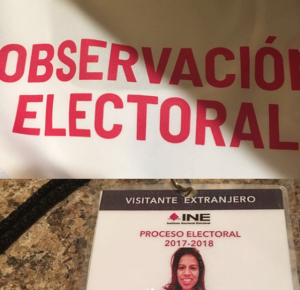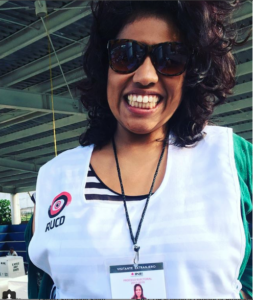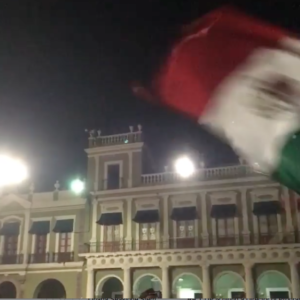In 2006, I lived in Mexico City for several months and by the end of my time there, I had undeniably fell in love with the largest city in North America. While there, I had spent several months writing, directing, and editing a documentary film which captured the labor rights struggle of gas station attendants part of an independent Mexican service union. Through this process, I was able to hear the stories of more than 50 attendants and better understand the perils of organizing within an environment meant to protect corporatist interests.
While working on this documentary, I watched the 2006 general presidential election unfold. I watched from the sidelines the unsuccessful attempt of Andrés Manuel López Obradaor better known as AMLO, then a PRD (Party of the Democratic Revolution) candidate, to win the election. I witnessed firsthand the confusion and controversy that emerged out of the election and watched as AMLO’s supporters set up encampments inside the Zócalo (the famous main square in the center of Mexico City) for months, in protest of what was believed to be an electoral fraud.

Marissa’s official ID and apparel for observing this year’s election.
It was also during that time I learned about the PRI (Institutional Revolutionary Party), the political party in Mexico that, up until 2000, had maintained political power for 71 years. I listened to countless stories of corruption, and the resulting desire for transparency for a “true democracy” in Mexico.
Twelve years later, I jumped at the opportunity with the UU College of Social Justice* to serve as an election observer for the 2018 general presidential election. According to Aljazeera via the Mexican National Electoral Institute (INE), the election was considered the “biggest election in Mexican history,” with numerous public issues being voted on and with “30 of 32 states [also holding] local elections.” In 2008, I had been an observer for the general Cambodia elections and was interesting in applying the skills I had learned there by participating in this historic election in the country of my ethnic roots.
Upon arriving in the country, I immediately was assigned to Xalapa, Veracruz, the capital of the third largest state within Mexico (four hours outside of Mexico City). I journeyed there together with a team of individuals from Argentina and Uruguay, as well as Mexican nationals. Throughout Mexico, there were dozens of volunteers from several different countries, all coordinated by the Red University and Citizen Network for Democracy (RUCD) and its affiliated networks, such as the Center for International Policy and Center of Human Rights Vitoria. We were tasked to lead a completely impartial observation over the course of three days. We strategized together and came up with a plan to visit as many polling sites as possible within the short time frame. At each site, we filled out forms assigned by RUCD to ensure that each polling site was following the correct procedures, that there were no irregularities at any of the sites, and that each person had access to vote safely and without pressure from any outside forces.

Marissa in her official election observation gear!
The day prior to the election, we visited with several different political party members, local members of human rights organizations, and attempted to visit several political party headquarters. At one of the party headquarters, we saw nearly four hundred individuals line up, with the hopes of receiving some sort of compensation for their political loyalty, a tragic reminder that corruption still lingers.
On the same day, we also participated in a press conference. Within 15 minutes, an array of different press affiliates from all across Veracruz met with us in a café at the center of the city. It was over as quickly as it had begun, and throughout the entire time the Argentina versus France World Cup game could be heard, blaring heavily in the background. [Note: you can see the article featuring Marissa and her team here.]
On the day of the election, we visited a school that had been converted into a tented polling place. At exactly 6PM local time, the sleepy polling site was closed to the public and was transformed by a frenzy of volunteers and polling staff into a frantic place of counting. Volunteers were racing against the clock as each of the votes were counted and recounted by hand. The sun slowly came down, and volunteers attempted to string a makeshift set of lights across the ceiling of the enormous tent. Alongside the authorized political party representatives, we watched as each vote was counted. Several hours later, the final counting of votes became to come in. Our polling site, along with many others across the country, began to input their votes into an electronic application, which showed that AMLO and his party, MORENA (National Regeneration Movement) would win by a landside, gathering nearly 53% of all the votes across the country.
After our long 15 hour day, as we slowly made our way back to our hotel, we soon realized that the hotel was the press conference central for the local MORENA officials. Upon stepping into the hotel, we were greeted by a flash mob of hugs, camera flashes, and loud cheers.
Later that night, myself and a group of the remaining observers went out to the central of Xalapa to see locals’ festivities in the city square. We watched as people cheered in celebration with guitars, car horns, bottles of beer, cups of corn, and hotdogs. One image still stands out to me: a young man pulls out a gigantic Mexican flag and waves it back and forth. I go up to him and ask him if I can take a picture and he cheerfully obliges. I watch the flag drift through the air, fluid against the night sky. Maybe the winds of change have come after all.

The Mexican flag waves in the air after the election.
* The UUCSJ is grateful to the following partner organizations who made this trip possible: the Center for International Policy (CIP), the Americas Program, and the Red Universitaria y Ciudadana por la Democracia (RUCD) [EN: the Red University and Citizen Network for Democracy]


